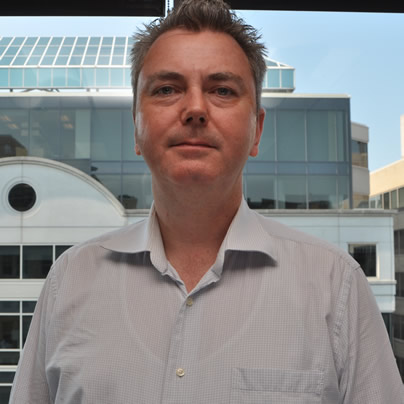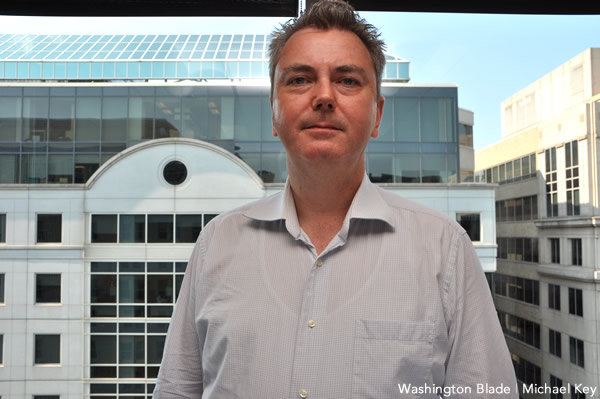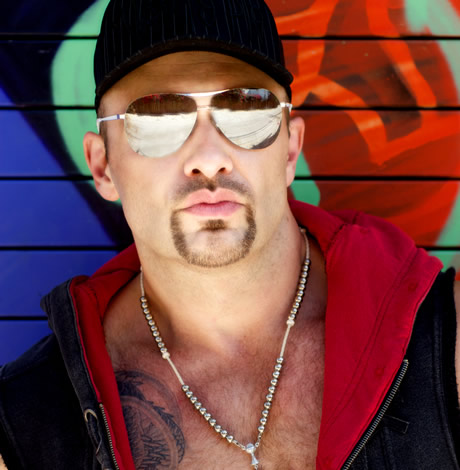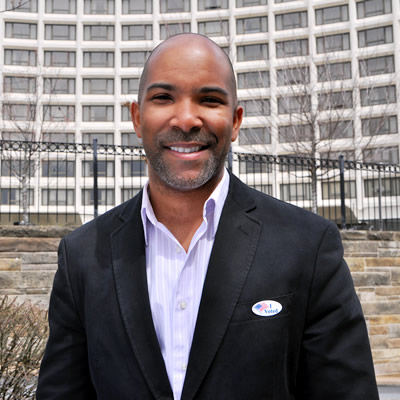Arts & Entertainment
Queery: Wayne Turner
The attorney and AIDS activist answers 20 gay questions

Wayne Turner remembers crying on the first day of school — although it was law school at UDC David A. Clarke School of Law and he was 40 years old that day in 2005.
“The founding professor, Edgar Cahn, was there telling us in this big orientation that their mission was to take bad-ass activists and unleash them on the world,” Turner says. “He said, ‘You’re not just here alone, you’re on the shoulders of everyone who’s come through here before.’ It was about seven years since my partner had died and I thought, ‘Yes, I have found my home.’ The tears just started streaming down my face so there I was, crying on the first day of school.”
Turner and his late partner, Steve Michael, who died of AIDS at age 42 in 1998 (Turner took Michael’s body to the White House as a gesture of protest), had what Turner calls a “roller coaster” seven-year relationship in which they dedicated themselves solely to activism and lived “a very hand-to-mouth existence. We were always changing residences, changing phone numbers. We lived a very mission-focused life and it was just like, ‘We gotta do this stuff.’ It was an issue nobody wanted to deal with.” Turner was a founding member of the AIDS advocacy and protest group ACT UP (AIDS Coalition to Unleash Power).
Turner, a Culver City, Calif., native, went to college in Portland, spent time in Europe, then lived in Seattle for about five years where he met Michael. They moved to Washington in 1993 with the express goal of “keeping Bill Clinton accountable” for his AIDS-related campaign promises.
Turner, who remains HIV negative, says going to law school — he earned full scholarships and graduated with honors — was perfect for him.
“I think of it as activism on steroids,” he says. “You gain so much clarity of how things work and how things are supposed to work. I highly recommend it to anyone who is active and involved. It’s like opening up a clock and saying, ‘Oh, that’s how that works.’”
Turner says he now has “his dream job” as a staff attorney at the National Health Law Program focusing on health care quality and access for low-income and disabled individuals enrolled in Medicaid.
He’s single, lives on the H Street corridor in Northeast Washington and enjoys camping and hiking with his dog, Mister, in and around Shenandoah National Park. (Blade photo by Michael Key)
How long have you been out and who was the hardest person to tell?
After the first year of college, my high school friend Robert and I came out to each other. We were just stating what was plainly obvious to each of us (and everyone else), but we had never talked about it before.
Who’s your LGBT hero?
My late partner Steve and the other amazing frontline AIDS activists, living and dead, who struggle and sacrifice so that others might live.
What’s Washington’s best nightspot, past or present?
Otter Crossing at the DC Eagle.
Describe your dream wedding.
One where DOMA has been overturned by the Supreme Court so that same-sex marriages are legally recognized by the federal government and in all 50 states.
What non-LGBT issue are you most passionate about?
Single payer health care. It means getting better care for less money from cradle to grave — what’s not to like about that?
What historical outcome would you change?
I wish Mario Cuomo went to New Hampshire in 1992. He would have won the primary, won the Democratic nomination and won the White House. We wouldn’t have had the disaster known as the Clinton administration with DOMA, DADT and the HIV immigration ban and travel restrictions. We might even have seen a Manhattan Project for AIDS, and could very well have a cure by now.
What’s been the most memorable pop culture moment of your lifetime?
Probably when Tinky Winky came out. I mean, we all knew, what with that red purse and all.
On what do you insist?
Punctuality
What was your last Facebook post or Tweet?
“YES WE CAN!” celebrating the Supreme Court decision upholding Obamacare. It is a huge victory, particularly for people with HIV who can qualify for Medicaid without having to wait for an AIDS diagnosis, and can’t be denied health coverage because of a pre-existing condition.
If your life were a book, what would the title be?
“Fasten your seatbelts,” because it has been one bumpy ride.
If science discovered a way to change sexual orientation, what would you do?
Find Ben Cohen.
What do you believe in beyond the physical world?
There’s something besides the physical world? I’ll believe it when I see it.
What’s your advice for LGBT movement leaders?
Too many so-called leaders seem to mistake photo-ops and cocktail party receptions for actual accomplishments. On-the-ground activists are providing the real leadership. Look at marriage equality — activists in Massachusetts propelled that issue forward in 2001 with Goodridge v. Dept. of Public Health. The national groups have been playing catch up ever since.
What would you walk across hot coals for?
Nothing. I have nice feet.
What LGBT stereotype annoys you most?
Victimhood. It perpetuates the perception that we are weak. Pity is no substitute for demanding respect and dignity.
What’s your favorite LGBT movie?
“Carrie,” the original with Sissy Spacek and Piper Laurie. It shows us that the best way to deal with high school bullies is to turn a fire hose on them.
What’s the most overrated social custom?
Saying “bless you” when someone sneezes. (See “physical world” response above).
What trophy or prize do you most covet?
Raphael Nadal.
What do you wish you’d known at 18?
That Apple stock would have been a really good idea.
Why Washington?
Sometimes at night I walk the dog around the Capitol. I’ll sit on the West steps and look out over the city, with stars and the moon and the Mall and the monuments and the glistening city lights, and I think “this view, at this moment almost makes up for the excruciating summer heat and humidity.” Almost. Actually, I really love D.C. I just wish I had a couple of senators and a representative.
a&e features
Eastern Shore chef named James Beard Finalist
Harley Peet creates inventive food in an inclusive space

In a small Eastern Shore town filled with boutiques, galleries, and the occasional cry of waterfowl from the Chesapeake, Chef Harley Peet is most at home. In his Viennese-inflected, Maryland-sourced fine-dining destination Bas Rouge, Peet draws from his Northern Michigan upbringing, Culinary Institute of America education, and identity as a gay man, for inspiration.
And recently, Peet was named a James Beard Finalist for Best Chef: Mid-Atlantic – the first “Best Chef: Mid-Atlantic” finalist representing the Eastern Shore.
Peet, after graduation from the Culinary Institute of America, took a position as sous chef at Tilghman Island Inn, not far from Bas Rouge. Falling in love with the Eastern Shore, he continued his passion for racing sailboats, boating, gardening, and fishing, and living his somewhat pastoral life as he opened Bas Rouge in 2016 as head chef, a restaurant part of the Bluepoint Hospitality group, which runs more than a dozen concepts in and around Easton, Md.
Coming from a rural area and being gay, Peet knew he had his work cut out for him. He was always aware that the service and hospitality industry “can be down and dirty and rough.”
Now as a leader in the kitchen, he aims to “set a good example, and treat people how I want to be treated. I also want to make sure if you’re at our establishment, I’m the first to stand up and say something.”
The Bas Rouge cuisine, he says, is Contemporary European. “I’m inspired by old-world techniques of countries like Austria, Germany, and France, but I love putting a new spin on classic dishes and finding innovative ways to incorporate the bounty of local Chesapeake ingredients.”
His proudest dish: the humble-yet-elevated Wiener Schnitzel. “It is authentic to what one would expect to find in Vienna, down to the Lingonberries.” From his in-house bakery, Peet dries and grinds the housemade Kaiser-Semmel bread to use as the breadcrumbs.
Peet works to support the LGBTQ community inside and outside of the kitchen. “I love that our Bluepoint Hospitality team has created welcoming spaces where our patrons feel comfortable dining at each of our establishments. Our staff have a genuine respect for one another and work together free of judgment.”
Representing Bluepoint, Peet has participated in events like Chefs for Equality with the Human Rights Campaign, advocating for LGBTQ rights.
At Bas Rouge, Peet brings together his passion for inclusion steeped in a sustainability ethic. He sees environmental stewardship as a way of life. Peet and his husband have lived and worked on their own organic farm for several years. Through research in Europe, he learned about international marine sourcing. Witnessing the impacts of overfishing, Peet considers his own role in promoting eco-friendly practices at Bas Rouge. To that end, he ensures responsible sourcing commitments through his purveyors, relationships that have helped create significant change in how people dine in Easton.
“I have built great relationships in the community and there’s nothing better than one of our long-standing purveyors stopping in with a cooler of fresh fish from the Chesapeake Bay. This goes especially for catching and plating the invasive blue catfish species, which helps control the species’ threat to the local ecosystem.
Through his kitchen exploits, Peet expressed a unique connection to another gay icon in a rural fine-dining restaurant: Patrick O’Connell, of three Michelin starred Inn at Little Washington. In fact, Peet’s husband helped design some of O’Connell’s kitchen spaces. They’ve both been able to navigate treacherous restaurant-industry waters, and have come out triumphant and celebrated. Of O’Connell, Peet says that he “sees [his restaurants] as canvas, all artistry, he sees this as every night is a show.” But at the same time, his “judgment-free space makes him a role model.”
Being in Easton itself is not without challenges. Sourcing is a challenge, having to either fly or ship in ingredients, whereas urban restaurants have the benefit of trucking, he says. The small town “is romantic and charming,” but logistics are difficult – one of the reasons that Peet ensures his team is diverse, building in different viewpoints, and also “making things a hell of a lot more fun.”
Reflecting on challenges and finding (and creating) space on the Eastern Shore, Peet confirmed how important it was to surround himself with people who set a good example, and “if you don’t like the way something is going … move on.”

Team DC, the umbrella organization for LGBTQ-friendly sports teams and leagues in the D.C. area, held its annual Night of Champions Awards Gala on Saturday, April 20 at the Hilton National Mall. The organization gave out scholarships to area LGBTQ student athletes as well as awards to the Different Drummers, Kelly Laczko of Duplex Diner, Stacy Smith of the Edmund Burke School, Bryan Frank of Triout, JC Adams of DCG Basketball and the DC Gay Flag Football League.
(Washington Blade photos by Michael Key)




















The 2024 National Cannabis Festival was held at the Fields at RFK Stadium on April 19-20.
(Washington Blade photos by Michael Key)
















Covering the @NatlCannaFest at RFK Stadium for @WashBlade . Stop by the LGBTQ+ booth and pick up a paper if you are here. pic.twitter.com/is7hnsaPns
— Michael Patrick Key (@MichaelKeyWB) April 20, 2024
-

 State Department2 days ago
State Department2 days agoState Department releases annual human rights report
-

 Maryland4 days ago
Maryland4 days agoJoe Vogel campaign holds ‘Big Gay Canvass Kickoff’
-

 Politics3 days ago
Politics3 days agoSmithsonian staff concerned about future of LGBTQ programming amid GOP scrutiny
-

 The White House1 day ago
The White House1 day agoWhite House debuts action plan targeting pollutants in drinking water










